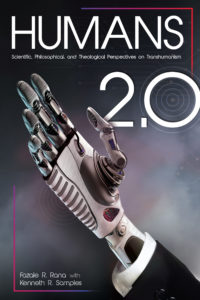 It’s been said that there are some things that money can’t buy. But although money may not be able to buy good health, it can buy research. In Humans 2.0: Scientific, Philosophical, and Theological Perspectives on Transhumanism, biochemist Dr. Fazale R. Rana teams up with philosopher Kenneth R. Samples to examine the amazing research-driven advances that promise to forever change the practice of medicine and significantly improve your quality of life. In fact, some of these rapidly developing technologies may fundamentally alter the human experience — a prospect both hoped for by some and feared by others.
It’s been said that there are some things that money can’t buy. But although money may not be able to buy good health, it can buy research. In Humans 2.0: Scientific, Philosophical, and Theological Perspectives on Transhumanism, biochemist Dr. Fazale R. Rana teams up with philosopher Kenneth R. Samples to examine the amazing research-driven advances that promise to forever change the practice of medicine and significantly improve your quality of life. In fact, some of these rapidly developing technologies may fundamentally alter the human experience — a prospect both hoped for by some and feared by others.
Science and science fiction seem to be merging as we rapidly approach what has been termed the “transhumanism singularity” — a moment in time when humans will self-advance so radically that we will be defined differently as a species. The most radical of transhumanists seek nothing short of eternal life and are prepared to download their consciousnesses into a supercomputer if necessary to achieve it. The new lifestyle options and outlooks afforded by emerging technologies will not only impact individuals. Their mere availability will restructure societies and require laws to govern their implementation.
These are game-changer technologies.
The same biomedical manipulations that relieve suffering today might be used for more questionable purposes tomorrow. They are causing us to ask new questions of ourselves that we have never asked before:
- Under what circumstances would you consider altering your own genetic code?
- Would you consider replacing your own healthy limbs with artificial ones that would be stronger and more durable?
- How might your lifestyle, values, and attitudes change if you could extend your life indefinitely?
- Could you accept in good conscience the benefits of research advanced through the destruction of human embryos?
- Who should have access to the benefits of these new technologies?
As they say, “The devil is in the details.” Humans 2.0 uniquely combines the perspective and expertise of a scientist with that of a philosopher to help the reader better discriminate between what can be done versus what should be done. Rana and Samples applaud the benefits of human ingenuity but also acknowledge the very human propensity to create new problems that are more destructive than those we solve. Careful to not project a dystopian future, they challenge people of faith to respond to novel technologies with both circumspection and hope. Small group studies will benefit from discussion questions at the end of each chapter, and the book’s numerous references to popular comic book superheroes will almost certainly provoke lively and enthusiastic conversations.
Topics such as gene-editing, computer-brain interfaces, anti-aging strategies, and even artificial wombs are explored with a fair degree of scientific rigor and detachment. If you are science-averse, you can skip ahead to other sections that parse out their social, ethical, and theological significance. There, transcendent principles of the Christian faith are shown to provide a balanced standard by which to promote good science and its proper implementation. Made in the image of God, humans are to subdue the resources of this world for the good of all. We must foresee potential problems and ascertain how to best regulate progress. We must safeguard those who are weak and defenseless. We must engineer in ways that heal, restore, and bring hope.
We must use our superpowers for good rather than evil.
This calls for wisdom. Let the reader taste and see if transhumanism is good. Sample the technologies. Take a few sips and decide if you are ready to drink from this fountain—and if so, at what cost?*
Quite surprisingly, the 1992 dark comedy Death Becomes Her offers some profound insight in this regard. The two main characters are vain, envious, and manipulative women. Their acquisition of immortality only makes them more brazen and insufferable. They can forgo many consequences of their selfish and unrestrained behaviors…but not all. Limitations imposed by the world around them continue to complicate their lives. And, indeed, they will live on forever but in a state that still permits increasing distortion and wretchedness.** Eventually they have only each each other to rely upon despite their mutual loathing. As mortals around them pass away, they linger in their misery and it ever grows.
The bottom line? Mortality is not our primary problem. The truth is that we are stinkers. We are damaged goods, and no scientist can ever deliver us from the worst parts of ourselves. We need renewal of a different kind. Though the word “redemption” has fallen out of fashion, in our less-than-emotionally-healthy moments we know that we need it. We each need a transformation that goes beyond the physical, penetrating deep down into our soul and birthing a new spirit that can endure the test of time with grace and peace. Will transhumanism distract from a salvation more potent? Choose your savior wisely, for there are many places in the human heart that innovation cannot penetrate.
”…I am the Alpha and Omega, the beginning and the end. To the thirsty I will give from the spring of the water of life without payment.” Revelation 21:6
*Isaiah 55:1-2; Revelation 21:6
**The first couple was delivered from a similar fate by being driven away from the Tree of Life once they had been marred by sin. See Genesis 3:22-24.